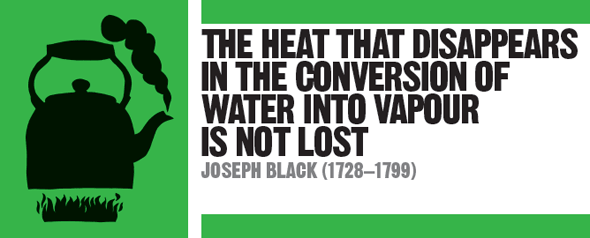
IN CONTEXT
Chemistry and physics
1661 Robert Boyle pioneers the isolation of gases.
1750s Joseph Black weighs materials before and after chemical reactions – the first quantitative chemistry – and discovers carbon dioxide.
1766 Henry Cavendish isolates hydrogen.
1774 Joseph Priestley isolates oxygen and other gases.
1798 American-born British physicist Benjamin Thompson suggests that heat is produced by the movement of particles.
1845 James Joule studies the conversion of motion into heat and measures the mechanical equivalent of heat, stating that a given quantity of mechanical work generates the same amount of heat.
A professor of medicine at the University of Glasgow and later at Edinburgh, Joseph Black also gave lectures on chemistry. Although he was a notable research scientist, he rarely published his results formally, but instead announced them during his lectures; his students were at the cutting edge of new science.
Some of Black’s students were the sons of Scottish whisky distillers, who were concerned about the costs of running their businesses. Why, they asked him, was it so expensive to distil whisky, when all they were doing was boiling the liquid and condensing the vapour.

An idea brought to the boil
In 1761, Black investigated the effects of heat on liquids, and discovered that if a pan of water is heated on a stove, the temperature increases steadily until it reaches 100°C (212°F). Then the water begins to boil, but the temperature does not change, even though heat is still going into the water. Black realized that the heat is needed to turn the liquid into vapour – or, in modern terms, to give the molecules enough energy to escape from the bonds that hold them fast in the liquid. This heat does not change the temperature, and seems to disappear – so Black called it latent heat (from the Latin for “hidden”). More precisely, it is the latent heat of evaporation of water. This discovery was the beginning of the science of thermodynamics – the study of heat, its relation to energy, and the conversion of heat energy into motion to do mechanical work.
Water has an unusually high latent heat, meaning that liquid water will boil for a long time before it all turns into gas. This is why steaming is such an effective way of cooking vegetables, why steam has terrible scalding power, and why it is used in heating systems.

Black is shown here visiting the engineer James Watt at his workshop in Glasgow. Watt is demonstrating one of his steam-powered instruments.
Melting ice
Just as heat is needed to turn water into steam, so it is needed to turn ice into water. The latent heat of melting ice means that ice will cool a drink. To melt the ice requires heat, and this heat is extracted from the drink in which it floats, thus cooling down the liquid.
Black explained all this to the distillers, although he was unable to help them save money. He also explained it to a colleague called James Watt, who was trying to work out why steam engines were so inefficient. Subsequently, Watt came up with the idea of the separate condenser, which condensed the steam without cooling the piston and cylinder. This made the steam engine a far more efficient machine, and made Watt a rich man.
JOSEPH BLACK

Born in Bordeaux, France, Joseph Black studied medicine at the universities of Glasgow and Edinburgh, conducting chemical experiments in the laboratory of his professor. In his 1754 doctoral thesis, Black showed that when chalk (calcium carbonate) is heated to become quicklime (calcium oxide), it does not gain some fiery principle from the fire, as was commonly believed, but loses weight. Black realized that this loss must be a gas, since no liquid or solid was produced, and called it “fixed air” because it was an air (gas) that had been fixed in the chalk. He also showed that fixed air (which we now know as carbon dioxide) was among the gases that we exhale.
While professor of medicine at Glasgow from 1756, Black conducted his landmark research on heat. Although he did not publish his results, his students circulated his findings. After moving to Edinburgh in 1766, he gave up research to focus on lecturing and – as the Industrial Revolution gathered pace – advising on chemical-based innovations in Scottish industry and agriculture.
See also: Robert Boyle • Joseph Priestley • Antoine Lavoisier • John Dalton • James Joule